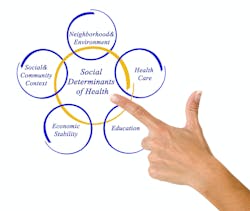The LOINC and Health Data Standards program at Regenstrief Institute has received a $4.4 million grant to support work on an initiative to categorize and standardize social determinants of health (SDOH) information into electronic health records.
The new four-year project, supported by the Regenstrief Foundation, will be led by LOINC and Health Data Standards at Regenstrief and HL7’s Gravity Project.
The unequal distribution of income, food, safety and access to healthcare are recognized as root causes of health disparities. But, currently, data on these factors are rarely well documented within a patient’s EHR. When this information is captured, it appears in varied, non-standardized terminologies, disconnected from clinical data and is at best cumbersome and at worst impossible to use.
The Gravity Project-LOINC and Health Data Standards team will create, identify and build a critical mass of standardized SDOH data elements. This work will enable clinicians to monitor, evaluate and address patients’ social and clinical needs comprehensively, positively impacting individual patients as well as supporting efforts by healthcare systems and government agencies to track health inequities at the population level. It will also benefit research into health disparities, supporting studies to evaluate the impact of interventions on inequities in healthcare access, care delivery and patient outcomes.
“The foresight encompassed in this funding means Regenstrief, through its LOINC and Health Data Standards program, can now come to the table with partners such as the Office of the National Coordinator for Health Information Technology and the Gravity Project of HL7 International to continue to expand the strategic implementation of social determinants of health data in electronic health records,” said Marjorie Rallins, D.P.M., M.S., executive director of LOINC and Health Data Standards, in a statement. “We’ve worked on SDOH projects with the Gravity team, but this support allows for us to expand our collaboration and participation in a more comprehensive approach.”
“As a multi-stakeholder collaborative, Gravity has successfully introduced a nationally recognized set of open-source, standards-based terminologies to support care across 19 social risk domains,” said Vanessa Candelora, Gravity Project program manager, in a statement. “Gravity is excited to collaborate with the LOINC and Health Data Standards team to continue the drive toward a world where health and social care organizations readily share the information needed to effectively meet the social needs of individuals and advance health equity and improve health outcomes in communities by using standard terminology and technology.”
The initiative will focus on data standards for a number of critical social risk domains, which may include some or all of the following:
• neighborhood safety
• access to green space
• food access
• adverse childhood experiences/toxic stress
• weathering
• minority strain
• immigration status
• history of incarceration
Other domains are in the planning phases.
Sponsored Recommendations
Sponsored Recommendations


